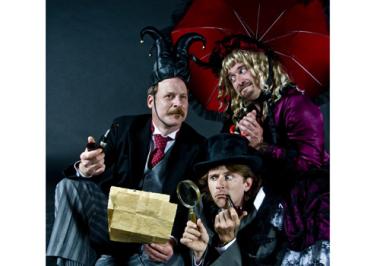In these even-tougher times for the arts, the one-person play is enjoying an enforced resurgence. Shakespeare & Company mounted three of them this year, Amherst's Ko Festival formed its whole summer season around solo shows, and now the Berkshire Theatre Festival has extended its season with a one-man offering.
The genre is particularly given to portraits of real people, usually seen in later years, looking back over a long life, with the inevitable comparison of the golden years of their heyday with the pains of aging and pangs of loss. The best of these encounters make us feel that we really are having an intimate, if one-sided, chat with a person of consequence. Red Remembers, by Andrew Guerdat, is one of them.
Our host is Walter "Red" Barber, a pioneer of baseball play-by-play broadcasting on radio and television, first for the Brooklyn Dodgers, then for the Yankees. He's in the study of his Florida retirement home regaling an unseen visitor with tales from a full and notable career.
In David Garrison's pitch-perfect performance, he's a creaky 83-year-old with a stiff back and shaky hands. But he's still energetic and garrulous, delighting in the old stories of memorable plays and players, of the feats and foibles of the high and mighty, and the excitement of New York in the '40s and '50s. Director John Rando has added occasional black-and-white projections on the back wall to illustrate the era and its personalities.
Barber sometimes sits at his desk behind an old-fashioned carbon microphone to recreate some broadcasting highlights in his folksy style littered with signature catch phrases like "Oh, Doctor!" and "I'll be a suck-egg mule!" And he tells the story of Jackie Robinson from his own perspective. Mississippi-born, Florida-reared, Barber at first objected to the entrance of a black man into the Dodger clubhouse, but—like so many others and the game itself—he was profoundly changed by the young man's awesome talent and heroic grace under fire.
Since a bleeding ulcer almost killed him back in 1948, he doesn't drink (well, maybe a sip or two of straight whiskey) but he mixes a daily martini for his beloved wife, Lylah, who is in the next room. We never see her, of course, but Barber's attention is constantly drawn to her. It's their relationship, past and present, on which the play ultimately turns.
His reminiscences are entertaining and, especially if you're a fan of baseball lore like me, fascinating. But an undercurrent of loss runs between them. It's not regret for the glory days, and not only the decline of physical faculties, but the loss of loved ones, especially Lylah, whose suitcase Barber is packing for reasons we grasp toward the end.
Barber repeatedly loses his train of thought in the middle of stories, so some of them string out in several installments. "My memory is as slippery as boiled okra," he complains, tapping both sides of his head in these senior moments. But while most one-person biographies trade in memories, this one has memory itself as a subject.
"A human memory is the last living record of a life lived on this earth," he says at one point. What Barber shares in the 90 minutes we spend in his company is his—and the playwright's—engaging and eloquent attempt to capture that living memory.
*
And now for something completely…
Shakespeare & Company's irresistible slapstick production of The Hound of the Baskervilles is being called things like "Sherlock Holmes meets Monty Python." And that's not far wrong. Arthur Conan Doyle didn't expect people to take the adventures of his brilliant, eccentric sleuth too, too seriously, but he might be turning in his grave to see them rolling in the aisles at this frenzied, farcical treatment of one of his classic mysteries. The piece is so cheerfully Pythonesque you half expect Graham Chapman's stuffy British colonel to come barging in yelling "Too silly!"
An even more appropriate descriptive might be "Holmes meets Monty Python palling around with Irma Vep." Steven Canny and John Nicholson's parody adds the trashing of dramatic conventions, cross-dressing quick changes and gay innuendo of Charles Ludlum's Gothic horror spoof.
The authors have kept pretty close to Conan Doyle's plot about mysterious deaths in the jaws of a huge dog that prowls the dark, dank moor surrounding Baskerville Hall, "where the power of evil is exalted." Well, except for a few small departures, like making nice Beryl Stapleton into a flamboyant, fan-wielding Brazilian dancer and the stoical butler Barrymore into a repository of running gags. Tony Simotes' production also adds a couple of punning in-jokes about "the moor," reflecting back on last summer's Othello.
Three actors play all 16 roles—or more accurately, two actors play all but one of them—and do so at breakneck speed. Josh Aaron McCabe is Holmes, Holmes in disguise, the creepy lame moor-dweller Stapleton, his sister (or is she?), the (blind) butler and his weepy wife. Ryan Winkles is Sir Henry, the homicidal hound's intended next victim, plus a cigar-chomping cabbie and a kilt-clad "indigenous peasant yokel."
Dr. Watson, Holmes's blundering sidekick, gets Jonathan Croy all to himself. Croy is the still center of this maelstrom, often a straight man for the others, but he's a great straight-faced comic and more than holds his own among the zanies. Winkles gives a sly eye-twinkle to his roles, sharing the joke with us, and McCabe would steal the show with his multiple quick-change characters if the three performers weren't such a seamless ensemble.
The Hound of the Baskervilles: Through Nov. 8 at Shakespeare & Company, 70 Kemble St., Lenox, (413) 637-3353, www.shakespeare.org.
Red Remembers: Through Nov. 1 at Berkshire Theatre Festival, East St., Stockbridge, (413) 298-5576, www.berkshiretheatre.org.



